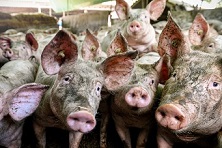Study Finds Why Pigs (No We Are Not Talking About Trudeau or Nehammer!) Do Not Get Sick Despite Exposure To SARS-CoV-2 And Having ACE2 Receptors
Source: Pigs And SARS-CoV-2 Feb 01, 2022 3 years, 10 months, 2 weeks, 6 days, 3 hours, 22 minutes ago
A new study by researchers from Iowa State University have discovered why pigs (No we are not talking about Trudeau, Nehammer, Biden, Macron or other Western dictators imposing jab mandates…these animals along with their families, staff and supporters will have their day of reckoning soon!) do not get sick when exposed to the SARS-CoV-2 coronavirus despite having ACE2 receptors.

The study findings showed that pig respiratory epithelial cells underwent apoptosis, or controlled cell death, in response to infection at a higher rate compared than to human epithelial cells and this could be the key clue that prevents pigs from getting sick.
The remarkable ability of SARS-CoV-2 virus to infect different species, including humans, dogs, cats, minks, ferrets, hamsters, tigers, and deer, pose a continuous threat to human and animal health.
Pigs, although closely related to humans and also possess ACE2 receptors, seem to be less susceptible to SARS-CoV-2.
Former in vivo studies failed to demonstrate clinical signs and transmission between pigs, while later attempts using a higher infectious dose reported viral shedding and seroconversion.
https://www.science.org/doi/full/10.1126/science.abb7015
https://www.sciencedirect.com/science/article/pii/S2666524720300896
https://www.tandfonline.com/doi/full/10.1080/22221751.2020.1831405
https://onlinelibrary.wiley.com/doi/10.1111/tbed.13861
https://www.ncbi.nlm.nih.gov/labs/pmc/articles/PMC7774549/
The study team investigated species-specific cell susceptibility, virus dose-dependent infectivity, and infection kinetics, using primary human (HRECs) and porcine (PRECs) respiratory epithelial cells. Despite higher ACE2 expression in HRECs compared to PRECs, SARS-CoV-2 infected, and replicated in both PRECs and HRECs in a dose-dependent manner. Cytopathic effect was particularly more evident in PRECs than HRECs, showing the hallmark morphological signs of apoptosis. Further analysis confirmed an early and enhanced apoptotic mechanism driven through caspase 3/7 activation, limiting SARS-CoV-2 propagation in PRECs compared to HRECs.
The study findings shed light on a possible mechanism of resistance of pigs to SARS-CoV-2 infection, and it may hold therapeutic value for the treatment of COVID-19.
The study findings were published in the peer reviewed journal: Cell Death Discovery.
https://www.nature.com/articles/s41420-021-00781-w
The study findings have uncovered an important clue that sheds light on why pigs don't get sick when exposed to the SARS-CoV-2 coronavirus.
Numerous studies since the start of the pandemic have noted that pigs can be infected by the virus if exposed to high doses, but the infection is self-limited and pigs don't show clinical signs of disease
nor do they transmit the virus to other animals.
Dr Rahul Nelli, a research assistant professor of veterinary diagnostic and production animal medicine at Iowa State University, and Dr Luis Gimenez-Lirola, an associate professor of veterinary diagnostic and production animal medicine, were behind the study to find out why pigs never got sick despite being exposed to the virus.
What they both found could lead to new ways to treat humans who contract COVID-19, the disease that results from infection by the virus SARS-CoV-2, said Nelli and Gimenez-Lirola.
Both Dr Nelli and Dr Gimenez-Lirola have studied how coronaviruses affect pigs for years. They've developed models that allow them to study in detail how viruses infect pigs and pig cells and how the cells respond to fight the infection.
For the study, the research team introduced the virus to cultured porcine and human respiratory epithelial cells, which line most of the respiratory tract.
The study findings showed that the pig cells underwent apoptosis, or controlled cell death, in response to infection at a higher rate than human epithelial cells.
Upon looking under the microscope, the study team found that there was an interesting phenomenon going on inside the cells. The nuclei of the infected pig cells were starting to shred into fragments but not uninfected pig cells.
Dr Nelli told Thailand
Medical News, “That shredding of the nucleus is a telltale sign of apoptosis, which may be a key in helping pigs avoid symptoms after exposure to SARS-CoV-2. Triggering apoptosis early in the infection essentially causes minimal tissue damage and confines viral replication, thus limiting severe illness. Human cells can undergo apoptosis in response to coronavirus infection as well, but the study found human cells do so much less frequently than porcine cells. Pig cells are roughly 100 times more likely to undergo apoptosis than human cells, according to the study findings.”
Dr Nelli further added, “Human cells are more likely to go through necrosis, another form of cell death that's less controlled than apoptosis. During necrosis, the contents of a cell release into the surrounding space, provoking a strong hyperimmune response that isn't triggered during apoptosis.”
The study team surmise that a wide-scale apoptosis response is helpful for avoiding disease because it disposes of infected cells quickly without the immune system overreacting, while wide-scale necrosis and the resulting hyperimmune response is less favorable to host cells.
Dr Giminez-Lirola said, "We don't want to over-conclude, but this response is probably something intrinsic to the pig immune system that is innate and not acquired. The idea is to kill the virus subtly but fast enough so there's not an excessive immune response triggered."
The study team said further study could lead to therapies designed to trigger apoptosis in human cells, allowing people infected with the coronavirus to avoid severe symptoms.
The study team from Iowa State University plan to conduct further research to identify all the genes activated during the infectious process and compare them with other animal species in which those genes are present. That could give them further clues about how and why other animals, such as deer, can carry the virus without suffering symptoms of disease.
For more about
pigs and SARS-CoV-2, keep on logging to Thailand Medical News.
Read Also:
https://www.thailandmedical.news/news/breaking-news-covid-19-livestock-contrary-to-previous-studies,-canadian-study-shows-that-pigs-are-susceptible-to-sars-cov-2
